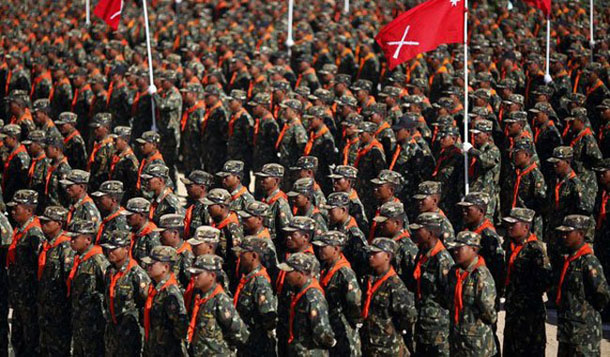Leaders of two Shan and Pa-O rebel groups that recently clashed because of a territorial dispute, held discussions on Thursday in an effort to resolve the argument, a rebel officer said.
The Restoration Council of Shan State (RCSS) Vice Chairman Gen. Sai Yee met with Pa-O National Liberation Organization (PNLO) Chairman Khun Myint Htun to discuss the firefight in Maukmae Township, southern Shan State, according to RCSS peace team secretary Lt-Col. Sai Ngin.
“They agreed to settle the territorial dispute in a peaceful manner,” he said, adding that they met at Loi Tai Leng, the RCSS headquarters located on the Burma-Thai border.
“We focused on controlling our ground forces so we will not exchange gunfire again,” Sai Ngin said, adding that the territorial dispute would be discussed in detail at a further meeting.
The meeting comes a week after both sides exchanged fire in a long-disputed area where both sides intend to build bases and homes for their ethnic villagers. Sai Ngin said the firefight had been settled and no causalities had been reported.
The RCSS alleged that the PNLO came to build houses in the area and ignored repeated warnings by the RCSS to leave. RCSS troops are still deployed in the disputed area, where it has been providing health and educational supports for Shan villagers.
The PNLO claimed that three of its fighters were captured and are being held against their will, but Sai Ngin denied these accusations. “These three soldiers came and joined the RCSS forces, we did not arrest them. If they want to go back home or have a desire to go back to their organization, we are ready to let them go,” he said.
Representatives of other ethnic armed groups, the Karenni National Progressive Party and Wa National Organization, also attended Thursday’s meeting in order to help mediate a solution.
Karenni National Progressive Party Chairman Abel Tweed said that Burma’s different ethnic groups should unite in order to negotiate a peace agreement with the government.
He said the groups should live in harmony in areas where they are neighbors, adding, “The dispute could be settled. We cannot push away or reject to the settlement of the ethnics—either Pa-O, Palaung, Shan or Wa—in Shan State.”
More than a dozen ethnic armed groups in Burma have been fighting a decades-old war with the central government, but clashes between rebels are not uncommon either. In Shan State, the Pa-O have long complained that they are being mistreated by the larger ethnic Shan minority.

















